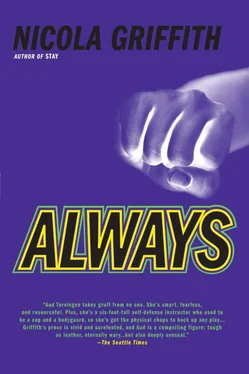“Anyone think they can do better?”
“Yep.” Suze picked up the imaginary handset. “Hello.”
“Hey, is this Annie?”
“Nope, fuck off, asshole.” Slam.
“That’s always an option,” I said. “But similar to using a pile driver on a picture nail. Anyone else?”
Therese raised a phone to her ear. She smiled. I nodded. “Hello.” “Hey, is this Annie?”
“No. What number are you trying to reach?”
“Is this Annie? Annie Contin?”
“No. I believe you have the wrong number. Good-bye.”
“Excellent,” I said. “The less people know about you, the less they can hurt you. Think about it: who in your lives has the power to hurt you most, to wound you cruelly with a word?”
“My mother.”
“My husband.”
I nodded. “The people who know us best can hurt us the most because they know us, know how we think and what our vulnerabilities are. Any information you give a stranger can be used against you. Anything. Information is valuable. Don’t give it away.”
I WOKE AT NOON ON SUNDAY WITH MY MUSCLES STEADY AND MY MIND GATHERING speed, cold and clear as a bobsled in its ice run. I got out of bed without having to think about it, called room service without referring to the number listings, and ordered breakfast—fruit and cheese—without a hitch.
The shower fittings were solid nickel-plated steel, heavy and cool. I twirled taps, watched the steam curl up from the tile floor. Even the water smelled different from the water in Atlanta; no heavy chlorine tang.
The water pressure was strong, the shower like a fizzing drill on my skin. I soaped thoroughly, found the light blue stain of small bruises on my inner upper arms, where the police officers had taken a grip, a scrape on my left shin and three tiny cuts on my right ankle, like paper cuts. I’d probably never know where they had come from.
Hard white tile, as in a hospital room. I increased the hot-water flow and my goose bumps went away.
My mother had moved me here while I was unconscious and had no say in the matter. But the Edgewater was a dark and damp place. Despite its moneyed smugness, the Fairmont was lighter and brighter, and my room accessible only via the door, not the water. So I’d stay. I didn’t need Suzanne anymore, so she could go.
I toweled my hair dry, smoothed moisturizer methodically on my back, and shivered—as I hadn’t for more than six months, since the nerves healed—when my hand ran over the bullet scar on the underside of my left arm.
AT THEbreakfast table by the bar, Suzanne did her best to take it philosophically. “Well, I guess it’s good that you’re feeling better. I mean, it is good, definitely.” She looked around wistfully while I wrote her check, and indeed the suite looked beautiful: thick glass tabletop gleaming in the sunshine, flowers vivid, Barber playing on the Bose.
I signed the check, handed it over. “I’m sorry about the lack of notice, but I’ve added a bonus.”
When she saw the amount, her pupils, clenched tight against the bright sunshine, expanded briefly. She folded it and put it in her pocket.
I stood. “Do you have more work lined up?”
“Oh, well, I work through an agency. It’ll be okay.” She touched her pocket unconsciously, and stood. “I’ll be okay.”
Even in Seattle I imagined it wasn’t too easy to get work as a private nurse with pink hair and a nose ring. I doubt my mother would have hired her if it hadn’t been a middle-of-the-night emergency.
She shrugged. “Well, hey, time to pack.” She gave the silk upholstered sofa one last pat and went into her room.
I set up my laptop on the table and opened Rusen’s spreadsheet, the employment information. It looked as though he’d been thorough.
No one knows for certain if it was Einstein who said, Everything should be made as simple as possible, but not simpler, but it is a useful guiding principle. This wasn’t, as the police appeared to think, a one-off grudge or a prank. There had been trouble with my property for two years. The trouble had continued with Hippoworks Productions. The drugging incident meant more trouble. It seemed entirely possible that there was some kind of connection. Also, as William of Ockham said, pluralitas non est ponenda sine necessitate. And Kick had seen no strangers on the set.
Hippoworks LLC had two partners, Rusen and Finkel, and two permanent employees, both of whom worked at their Culver City office in California. For the Feral production, they employed about four dozen others on a contract basis. They were nonunion contracts, but at scale, with the exception of Sîan Branwell, who, being the star, had a few extra clauses and a bit more money. The end-date of her contract surprised me: less than a week away.
I scrolled to Kick’s information. Not much: addresses, references, a City of Seattle business license for Film Food, plus a notation that Rusen had checked her bond and insurance information and had two outside references on file. I opened a Web search bar and typed in KUIPER, VICTORIA K, and got several dozen hits, all relating to Film Food. Her website was rudimentary: a few menus, contact information, a professionally shot photo of Kuiper in white coat and hat, knife in hand and smiling self-consciously.
I changed the search to KICK KUIPER, and this time got several thousand hits. IMDb had a list—a long list—of her films. Stunt! had a cover interview with “Top Diving and Driving Artist ‘Kick’ Kuiper” from four years ago. The picture was of a woman in a red harness suit smiling brilliantly, bright with that reckless shine that comes only from riding a wave of adrenaline to survival. The caption read “Kuiper on the set of Tantalus. ” I remembered that film. The action hero had been too old for the actress. The action scene with the actress had been good—Kick’s scene, I now realized.
There was also a smaller piece, about a year later, another interview, with Kick saying, “Hell yes, I’ll be back. The docs say the pins will be out in a month. Two months after that I’ll be as good as ever.” She sounded like a character from a fifties western, not like Kick at all. I backtracked, and found the news item—reported in Variety and Hollywood Reporter, even a one-liner in EW —about the fall that went wrong. I paid the subscription fee for the first two and read the articles.
“It’s pretty much a miracle she survived at all,” Benton “Buddy” Nels told us. “You fall from a hundred feet and you have to land right, you have to hit that sweet spot. You miss it and the bag flings you sideways at a wall or the sidewalk, hard, and real fast. Like shooting an egg from a catapult. You just break.”
And break Kuiper did, cracking two vertebrae and several ribs, and shattering her pelvis and right hip. Fortunately she landed on dirt that had just been dug over and fluffed for a horse-fall scene minutes earlier.
“They’re saying it was the dirt that saved her, and I understand that, but that’s not the whole story. Beyond that, there’s her superb physical condition. And beyond that, hell, I can’t explain it. There must’ve been some angel looking out for her that day.”
The word miracle cropped up three times, along with unbelievable and inexplicable.
Something caught my eye: a report a year before her accident from BusinessWeek, about product liability and various industry insurance rates. There was a thumbnail photo of Kick, noted stuntwoman Victoria “Kick” Kuiper, and a quote from her about why she wasn’t planning to sue the makers of her harness. “Stunts are dangerous,” she said. “***t happens.” I followed the link and found that that time it had been a broken scapula.
Читать дальше












